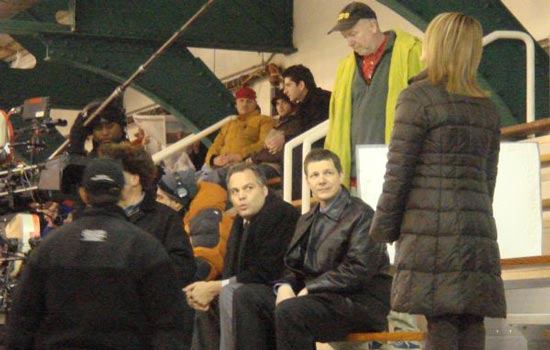RIT students, staffers appear on NBC drama
Vincent D’Onofrio, center, and Kathryn Erbe, far right, stars of
A group of eight RIT community members will make guest appearances April 3 on the NBC drama \"Law & Order: Criminal Intent.\" The group, which includes five students from the National Technical Institute for the Deaf, an NTID alumnus, NTID assistant professor Luane Davis Haggerty and Public Safety senior officer Idalia Vazquez, served as extras in the episode, which will deal with numerous deaf issues. The opportunity arose when Davis Haggerty, a union actress who runs a theatre company in New York City, was contacted by an agent who said the show was seeking deaf actors who could sign. Davis Haggerty agreed to accept the opportunity and offered the services of her students, as well.
The group drove to New York City Feb. 15 and was on the set for nearly 14 hours. Davis Haggerty says the experience was more than worth it. “It was a fabulous experience,” she says. “We were treated very, very well and with great respect. I had warned the students that, although this was going to be cool and a great first experience, there was probably going to be a lot of waiting around and it might be a little boring. That was not the case.”
Each member of the RIT group is expected to get camera time when the show airs at 9 p.m. on NBC (Channel 10 locally). Be on the lookout for them in the following scenes: Troy Chapman and Ruthie Jordan participated in a protest scene; Jordan and Karriefh Norman were seated on bleachers at an ice rink, directly behind two featured actors; Ayaz Ali, Norman and Karla Marrero were seated in the front row of a courtroom, directly behind the defendants; Davis Haggerty was invited to a deaf theatre show by the deaf featured actors as they came out of the courtroom; Vazquez can be seen as a protester, reacting to a statement in the courtroom and making a reaction as she observed a couple at an ice rink having a discussion; the entire group, including Martina Bell, served as detectives walking back-and-forth and talking on the phone in a squad room.
“This wonderful experience allowed me the opportunity to see what ‘real’ actors do—how much time and effort it takes to make a one-hour show,” Vazquez says. “The lead actors were down to earth. They spoke and ate with us as if we were all on the same level.” There was an added benefit for the students, who are all aspiring actors, in addition to the experience and the professional paycheck. Every actor must work a minimum of three Screen Actors Guild certified jobs (one in which you get paid and treated like a professional) in order to join its union. This experience counted as one of those jobs for each of the students. “Screen Actors Guild really helps their members do bigger work, so it’s a big deal,” Davis Haggerty says. “They may not become stars, but it helps them do regular extra work like this.”


